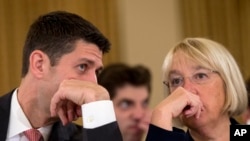CAPITOL HILL —
Leading lawmakers say House and Senate negotiators appear close to agreeing on a federal budget and avert another government shutdown. But sources close to the negotiations say the deal that is taking shape is modest, and not a so-called "grand bargain" that would tackle fundamental spending priority issues that have divided Congress for the past two years.
After more than two years of moving from one budget crisis to another, some lawmakers said they were optimistic members of the small budget conference committee were close to reaching an accord to at least fund the government.
Top negotiators, Republican Congressman Paul Ryan and Democrat Senator Patty Murray have been working behind closed doors to hammer out a deal before members of the House leave town for the year on Friday.
Speaking on ABC News This Week, Republican Senator Rob Portman highlighted some priorities for Republicans.
"... Not raise taxes, which is important during this weak economy, and actually avoid a government shutdown. So I am hopeful that even by the end of this week we will be able to come together and achieve that," he said.
Speaking on the same ABC NEWS program, Democratic Senator Dick Durbin was a bit more cautious.
"Negotiations are making progress, moving in the right direction. They have not closed the deal," he said.
Details have not been announced, but some congressional aides said the emerging deal aimed to partially repeal the unpopular across the board spending cuts known as the sequester, restoring some funding to some domestic and defense programs. To cover the costs, House Budget Chairman Ryan and Senate Budget Chairman Murray are wrangling over possible cuts to federal workers' pensions and higher security fees for airline passengers.
Due to one-on-one talks between Murray and Ryan, some members of Congress have expressed frustration they have been largely excluded from even knowing what is in the potential deal. But there is also a widespread desire among both Democratic and Republican lawmakers to avoid another breakdown in the talks that could lead to a costly and politically-damaging government shutdown in mid-January.
In the few remaining legislative days this year, lawmakers also need to pass a Farm Bill, and a measure to fund long-term unemployment insurance benefits will expire at the end of year unless Congress takes action.
Experts said it wa highly unlikely the Republican-led House would take up the issue of immigration reform any time soon.
After more than two years of moving from one budget crisis to another, some lawmakers said they were optimistic members of the small budget conference committee were close to reaching an accord to at least fund the government.
Top negotiators, Republican Congressman Paul Ryan and Democrat Senator Patty Murray have been working behind closed doors to hammer out a deal before members of the House leave town for the year on Friday.
Speaking on ABC News This Week, Republican Senator Rob Portman highlighted some priorities for Republicans.
"... Not raise taxes, which is important during this weak economy, and actually avoid a government shutdown. So I am hopeful that even by the end of this week we will be able to come together and achieve that," he said.
Speaking on the same ABC NEWS program, Democratic Senator Dick Durbin was a bit more cautious.
"Negotiations are making progress, moving in the right direction. They have not closed the deal," he said.
Details have not been announced, but some congressional aides said the emerging deal aimed to partially repeal the unpopular across the board spending cuts known as the sequester, restoring some funding to some domestic and defense programs. To cover the costs, House Budget Chairman Ryan and Senate Budget Chairman Murray are wrangling over possible cuts to federal workers' pensions and higher security fees for airline passengers.
Due to one-on-one talks between Murray and Ryan, some members of Congress have expressed frustration they have been largely excluded from even knowing what is in the potential deal. But there is also a widespread desire among both Democratic and Republican lawmakers to avoid another breakdown in the talks that could lead to a costly and politically-damaging government shutdown in mid-January.
In the few remaining legislative days this year, lawmakers also need to pass a Farm Bill, and a measure to fund long-term unemployment insurance benefits will expire at the end of year unless Congress takes action.
Experts said it wa highly unlikely the Republican-led House would take up the issue of immigration reform any time soon.








